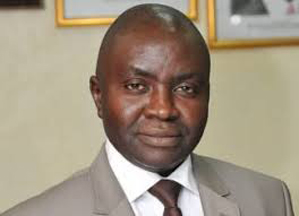Oluyinka Onigbinde
The Centre for the Promotion of Private Enterprise (CPPE) has called for the re-orientation of the Nigerian Port Authority (NPA), Nigeria Customs Service (NCS) as well as shipping companies and terminal operators, including security agencies at the port to help enhance trade facilitation in the country.

Founder and Chief Executive Officer, CPPE, Muda Yusuf, in his Independence Day message made available to our correspondent, stated that the international trade process needs to be reformed to prioritise trade facilitation.
Yusuf lamented that the current obsession for revenue generation is hurting international trade processes and impacting adversely on domestic and foreign investment. This is even as he called for the orientation of the NCS, NPA, the shipping companies and the terminal operators and the security agencies at the ports. He said the orientation of the agencies needs to change in favour of an investment-friendly international trade processes.
Lamenting the impact of the economy, he stated that the sluggish economic growth has failed to suppress the intense poverty in the land.
He noted that although the Nigerian economy had recorded an average growth performance over the past decades with a few instances of sluggish growth, the challenge of creating an inclusive growth trajectory remains a major concern.
“While the economy has experienced some positive growth trend over the past six decades, especially in the oil boom era, the impact on poverty, inequality and job creation has been very minimal. It is a case of growth with minimal development,” he stated.
In the area of private sector participation, he said: “Unlike what obtained at independence, the economy has witnessed impactful private sector footprints in many sectors, especially in the following: telecommunications and ICT, aviation, transportation, education sector, health sector, print and electronic media and many more. Accordingly, the contribution of the Nigerian private sector to the Nigerian economy has grown in leaps and bounds over the years,”
He noted some sectors have been significantly transformed over the past six decades, adding that one of such success stories is the telecoms sector.
Commenting on the state of the economy, the CPPE boss said the country’s macroeconomic management framework continues to pose serious challenges to investors in the economy and this situation has been further compounded by the shocks and disruptions inflicted by the Russian invasion of Ukraine and the lingering effects of the covid-19 pandemic.
He said: “The fragile macroeconomic conditions remain a major cause for concern. The troubling macroeconomic situation have manifested in the following ways in recent years: weak and depreciating currency, high inflationary pressure, high and rising debt profile, exchange rate volatility, liquidity crisis in the foreign exchange market, increasing fiscal deficit, growing debt service burden, and the acceleration of money supply growth following the rising CBN financing of deficit.
“There are profound concerns around investment climate issues. High infrastructure deficit, cargo clearing challenges which have continued to worsen, high transaction costs at the ports, weak productivity in the real sector largely as a result of infrastructure conditions, regulatory challenges and policy inconsistency.
“Persistent importation of petroleum products had continued to put pressure on foreign reserves and weakening the capacity of the CBN to support the forex market. Petroleum refineries have remained non-performing over the years.
“The fiscal position of the federal government and the states are very weak, characterized by high fiscal deficit, high and increasing debt profile and the associated debt service burden is a cause for concern.
“The state of insecurity continues to take its toll on the economy, especially on agricultural output and fueling food inflation. It is also impacting the confidence of investors. The spate oil theft and the associate leakages of government revenue is very troubling. Billions of dollars have been lost to this apparent failure of security effectiveness in the oil producing areas,” he stated.
He therefore recommended some way forward, saying: “There is a need for urgent steps to be taken to ensure a better macroeconomic management framework to stabilise the exchange rate, eradicate the challenge of illiquidity in the foreign exchange market and to stem the current depreciation of the Naira. It is imperative to have urgent reforms in the foreign exchange market with greater focus on supply side strategy. There is need to review the current disproportionate emphasis on demand management of the foreign exchange market. Most sectors are experiencing serious disruptions and dislocations because of the current foreign exchange policy regime.
“Steps should be taken to attract foreign exchange through a strategy of ensuring new investment opportunities to stimulate foreign capital inflows into the economy. We should be seeking more equity capital than debt capital.
Read Also: Nigeria’s Non-Oil Export Hits $2.6bn In Six Months – NEPC
“Need to review the country’s trade policy to support investment growth and investment sustainability. Tax policy must support investment not become a disincentive to investment.
“The security situation which has continued to deteriorate needs to be urgently addressed in order to mitigate the effects on investors’ confidence. There should be greater emphasis on quality intelligence in the war against terrorism.
“The oil and gas sector reform which is now being anchored on the Petroleum Industry Act [PIA] should be accelerated in order to ensure the unlocking of the enormous value in the oil and gas sector, particularly the gas sector.
“There should be an immediate cessation of the impunity that has characterised the stealing of crude oil and the attacks on oil installations.
“Institutional reforms are necessary to ensure that the regulatory institutions have better disposition to support the growth of investment and focus less on the generation of revenue.
“The international trade process needs to be reformed to prioritise trade facilitation. The current obsession for revenue generation is hurting the international trade processes and impacting adversely on domestic and foreign investment. Therefore, the orientation of the Nigeria Custom Service, Nigerian Ports Authority, the shipping companies and the terminal operators and the security agencies at the ports need to change in favour of an investment friendly international trade processes,” he stated.
Kindly like us on Facebook/twitter















